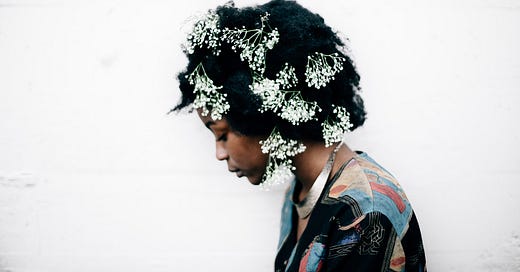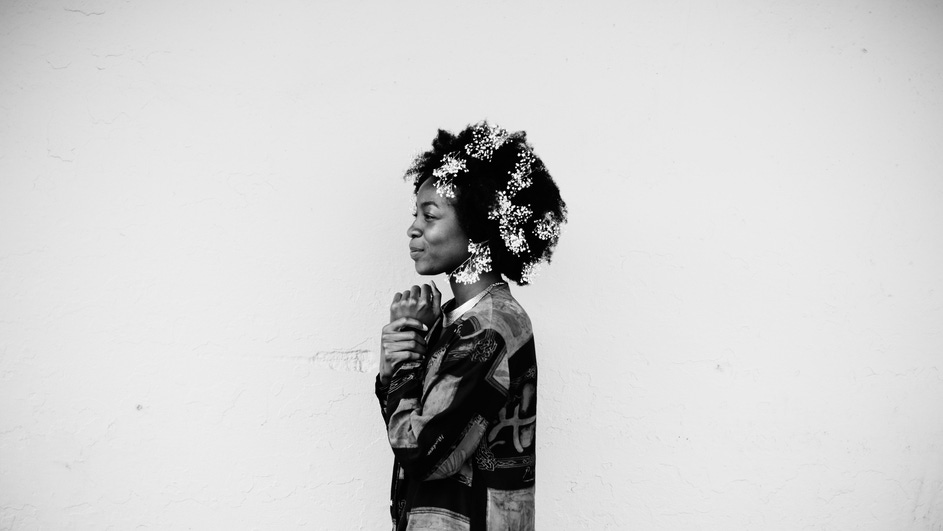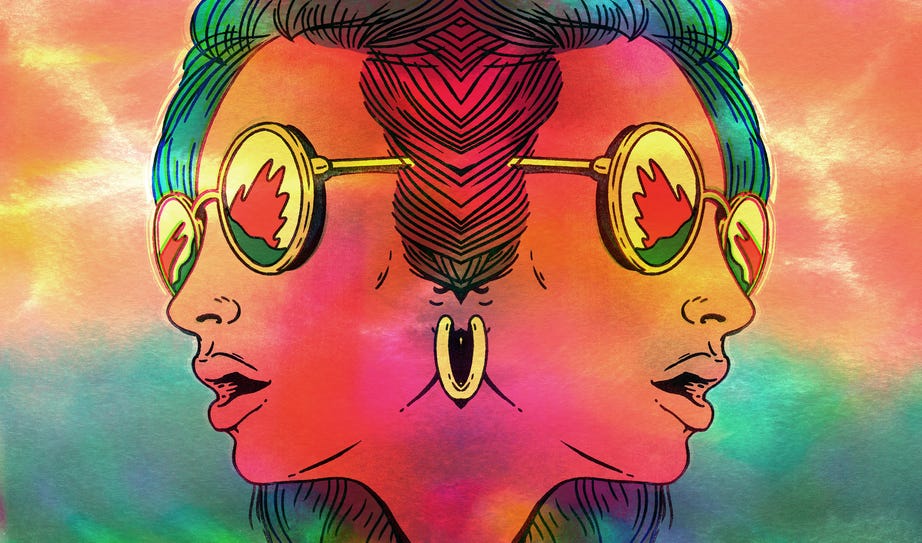Key Takeaways:
Internalized anti-blackness shapes choices: Reflections on how my internalized anti-blackness dictated my relationships, friendships, and career choices, leading me further away from self-acceptance.
Standards placed on black women: Black women face high expectations to be intelligent, educated, beautiful, well-spoken, and more, which can hinder their ability to thrive and be their authentic selves.
The illusion of white approval: Seeking white approval may provide temporary validation, but it is an illusion that can never truly fulfill or bring genuine change.
Liberation from whiteness: The importance of freeing oneself from the need for white acceptance and recognizing that concept of “whiteness” is not the key to true freedom.
Healing internalized anti-blackness: Healing involves loving and accepting all parts of oneself, humanizing black people, and having compassion for the black community as a whole.
Who is the Black Woman
“She is a college graduate. A drop-out. A student. A wife. A divorcee. A mother. A lover. A child of the ghetto. A product of the bourgeoisie. A professional writer. A person who never dreamed of publication. A solitary individual. A member of the movement. A violent revolutionary. She is angry and tender, loving and hating, she is all these things and more. And she is represented in a collection that for the first time truly lets her bare her soul and speak her mind. She is also a must-read text to be delivered into the hands of all of us who work to achieve the wonderful light of knowledge, love and beauty. She is an everlasting yes.” Toni Cade Bambara - “The Black Woman, An Anthology”
Dear Diary,
My internalized anti-blackness has dictated most of my choices in life. Who I dated, who I was intimate with, my friendships, what I wore, where I worked. All my choices steered me further and further away from what I perceived as the not-so-nice, undesirable, unacceptable parts of me.
Self-hate runs deep in the black community, especially among black women. I can't tell you how many conversations I've had with the black women in my family and group of friends who have struggled most of their lives to love and accept themselves in a world that is constantly telling them that they're not good enough, they have to work twice as hard for half the reward, and that there are only so many seats at the table. And not only are there so many seats at the table, but you have to be a specific type of black person to even get a seat. Assimilation, respectability, and desirability have been the name of the game as a black woman in America, and if you refuse to play, you often find yourself falling behind. There are standards placed on black women that are not placed on other women in America.
We must be intelligent, educated, beautiful, well-spoken, sexual but not too sexual, graceful, feminine, soft, presentable, and approachable. These are some of the bare minimum "skills" a black woman must possess to survive. Our ability to thrive in most spaces is stripped away from us because of the high expectations placed on us. Being enough has become a quest to fulfill, but it is unattainable because we don't set the standards white supremacy and patriarchy do. The standards are sometimes placed too high, but if I've learned anything from being a black woman, it is that we will show up and show out, even if it's to our detriment.
Addressing my anti-blackness has allowed me to see where I have played a part in upholding white supremacy and keeping myself tethered to the white gaze. The white gaze can feel powerful. Whiteness, at times, seems like the only pathway to opportunities, wealth, health, and prosperity. But what I've learned throughout the years is possessing the white gaze isn't always enough; you must also have white approval. Having the approval of white people can feel safe like nothing bad can happen to you. Whiteness can sometimes make you feel seen, loved, accepted, or like you belong, but it is only an illusion. Because with one misstep, word, or disagreement, you will find yourself on the other side of their admiration because the truth is, no matter how you try, you'll never be them. You will never be considered one of them, and they will sell you out before they see you win or get ahead. Having the approval from whiteness can sometimes be like running in place; you feel like you're moving, but in reality, you're not getting anywhere.
"For the master's tools will never dismantle the master's house. They may allow us to temporarily beat him at his own game, but they will never enable us to bring about genuine change. Racism and homophobia are real conditions of all our lives in this place and time. I urge each one of us here to reach down into that deep place of knowledge inside herself and touch that terror and loathing of any difference that lives here. See whose face it wears. Then the personal as the political can begin to illuminate all our choices."
― Audre Lorde
Once I began to see that this system of oppression would forever have me in chains, that my oppressor would always be the oppressor unless I changed, I knew I had come to a crossroads. Liberate myself, or forever be under the guise that whiteness was my key to freedom. I chose to free myself from the bondage of needing to be loved and accepted by white people that I had to be seen as enough through the lens of whiteness.
What I share is not pointed toward white people but the institutions they have built over several centuries that only benefit them and them alone. Don't get me wrong, you can survive in these institutions as a black woman, but you will not thrive. Sure, you can make your coins, purchase luxury items, and feel like you're on the come-up, but is the come-up real if you have to check parts of yourself at the door? If the wholeness of who you are isn't truly accepted. If you have to be the "perfect" version of yourself to get a foot in the door? What is the point?
I'm just coming to understand how insidious internalized anti-blackness is. It has become my hungry ghost, asking more and more of me until I look up and realize I have nothing to give. I've become everything that was expected of me and then some. Still, because I'm not Oprah, Michelle Obama, Beyoncé, or any other prominent black figure used against ordinary black folks as an example of pulling ourselves up by our bootstraps, I'll never have a seat at the table? Fuck that!
I'm an ordinary, smegular, degular black woman, and I am enough.
I'm enough just as I am.
I have nothing to prove.
Internalized anti-blackness will have you striving out here in these streets, running yourself ragged. And that's not the vibe.
Healing my internalized anti-blackness means loving and accepting the parts of me I disowned in the name of belonging. It means humanizing myself and other black folks. It means having compassion for black and melanated people. It means knowing at my deepest core that we will never be free until we are all free.
It means believing I am enough with my whole body, mind, and soul. Who I am, as I am, is enough.
Black women. A love letter.
Beautiful, gorgeous, and gracious Black Women.
Black Women who were once little black girls who weren't sure where they fit into the world. Forever feeling like they didn't belong anywhere and had to bravely pave their path. I know what it feels like to float around, unsure where to ground or tether yourself. Your inner child is unsure where to call home.
But you are home.
Your body is your home.
Your womb is your home.
Your heart is your home.
We are holding an insurmountable amount of sadness and grief in our bodies. Pain has become our legacy. Joy and delight seem like ships passing in the night.
But I realize this doesn't have to be our fate.
Joy, pleasure, and delight can become our legacy. We get to breathe life into a new way of being, but we can't do it alone. Healing must become a community effort.
We must release old beliefs that there are only so many seats at the table. We must release the story that if I have, someone must go without. We must begin believing that there is more than enough, that success is not defined as a seat at some arbitrary table but is defined by the health and wealth of our community. We must release the belief in individualism, and the story of capitalism and patriarchy has pushed down our throats that we have to go it alone.
NO!
We must go together. We are strong, vibrant, alive, and powerful together.
Though I am here to hold space and a vision of empowered people, I am personally here to serve black Women and Femmes.
Why?
Because as Brother Malcolm stated:
"The most disrespected person in America is the Black Woman. The most in-protected person in America is the Black Woman. The most neglected person in America is the Black Woman."
We were bought and sold.
Bred.
Babies ripped from our arms.
We've been whittled down to stereotypes.
We've been taught to hate ourselves.
We've been taught to be suspicious of one another.
It is time to heal.
It is time to restore our wholeness.
It is time to mend our wounds.
It is time to rewrite our story.
How do we heal?
"Pain is important: how we evade it, how we succumb to it, how we deal with it, how we transcend it."
― Audre Lorde
The path towards healing is a collective conversation because internalized anti-blackness doesn't just paint how we see ourselves but also one another. It impacts how we interact with one another in our communities and how we move through society.
I love black women because they raised, nurtured, and supported me. Loving other black women has allowed me to love myself.
There is nothing like a room full of black women lifting each other up. It's all love. So, it only makes sense that we collectively support each other on our healing journey. Of course, it will look different for everyone, but the intention is the same.
I would love to hear from the black women who read this newsletter.
What comes up for you when you hear the words internalized anti-blackness?
What is the physical response in your body?
What about this conversation resonates with you?
What is your process of understanding and healing your internalized anti-blackness?
How has your internalized anti-blackness shaped how you see yourself and the world?
Please feel free to share in the comments below. I look forward to hearing from you.
With Love.
🤭Shits & Giggles:
😊 Shit that made me giggle
🤓 Shit that made me learn
👂Shit that’s important
👀Sneak Peak of Thursdays “Shits & Giggles” Newsletter:
“The Shit Show that is Privilege” - Excerpt
It's been seven months since we arrived in Turkey, and it has been a whirlwind of a ride.
I never thought I'd be down to live in Turkey. In fact, when Dogan, my husband of 15 years, brought up the possibility of moving here, I was a no, then a maybe, and eventually, I became a full-body YES.
As we weighed the pros and cons, we realized it made sense for our family to move to Turkey for a year or two while our son was still young.
Reasons we moved to Turkey
My son could learn the language and the culture and, most importantly, form bonds with his Turkish family
I could learn the language and hopefully become fluent in the language. One can hope. I'm not going to lie; Turkish is hella hard, and if you don't believe me, here's an article to explain why.
We would have so much more family support. Dogan has a huge family; the man has thirty-two first cousins. Thirty-two!
For us as Americans, the cost of living is less expensive than our cost of living in Los Angeles. We'll be able to save some money before heading back to the States in a few years.
Travel is very important to us, and it's challenging to travel to parts of Europe from the United States; I mean, a flight from LA to Istanbul is fourteen hours. We want to take advantage of being so close to Europe and visit or revisit countries.
I'm sure I could add to this list, but the reasons above are the ones that weighed heavily on our decision to pack up our life in the US and head to Istanbul. It wasn't an easy decision. It took us about a year of back and forth, two trips to Turkey, and several discussions to decide to move.
Moving to a foreign country where I had to establish residency to remain legal, and going through the process of collecting the necessary paperwork, jumping through hoops, my husband talking to a lawyer to make sure all our paperwork was in order, going to the immigration office only to find out paperwork was missing and also all paperwork filed needed to be in a red folder, was exhausting.
And yet it was also easy because I had someone who spoke the language, understood the culture and bureaucracy, and knew people who could point us in the right direction. I also had the power of my American passport. If everything fell through and my paperwork was rejected, I could always return home or leave the country for Europe for a few days, return to Turkey, and get another 90-day visa. I also had the money to do so, which makes things 100 times easier.
At this moment, I realized just how much Privilege I held in this situation, a privilege many individuals moving to or immigrating to another country often don't have. This experience humbled me because it made me realize how many stumbling blocks individuals encounter when seeking a better home, opportunities, and a safe place to call home.
In this newsletter, I want to talk about Privilege. The types of Privilege there are, why most people are ashamed of their Privilege, and why denying one's Privilege can be extremely dangerous.
In my opinion, Privilege isn't something to be ashamed of, but it is something to be extremely aware of because if you're not, it can become easy to abuse and misuse your Privilege.
📨 Subscribe to The Shit Show Diaries:
A new newsletter drops every Monday and Thursday!
🌎Monday’s newsletter is the “Welcome to the Shit Show” series. In these essays, we'll be diving into all things political, spiritual, and personal development. My goal here is pretty simple: I want you to discover something new or see a familiar topic in a whole new light.
😅Thursday's newsletter is all about "Shits and Giggles," where I spill my thoughts on a specific topic. Plus, I’ll be sharing awesome content from creators I adore and am learning a ton from.






